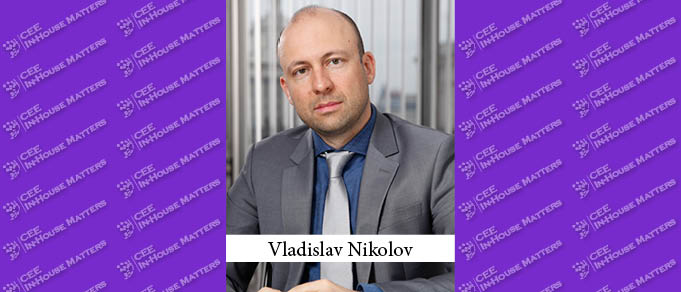Vladislav Nikolov, General Counsel at EnduroSat in Sofia, Bulgaria, explains why creative problem-solving, critical thinking, and communication skills are necessary for GCs in today’s world.
“Panta rei …”
Once, an Ionian philosopher said a few simple words which remain an unbeaten concept to this day – “everything changes, everything flows.” Heraclitus of Ephesus, the ancient Greek who lived around 500 BC, bequeathed us something so obvious, that it is easy to neglect it in our day-to-day life.
Nowadays we live in a much more open and complex world than the one of Heraclitus. Current geopolitical contrasts are leading to an increase of international and local regulations (often being limitations, in fact) resulting in a more complicated legal framework, which challenges the business environment.
At the same time, the technological revolution, with its constantly increasing temptations and its aspiration for an “Open World,” lives its own life.
These parallel processes bring lots of challenges to any legal counsel who is keen on the profession and daring to make things happen. Here I am not even attempting to differentiate between in-house and external corporate professionals. All we do is facilitate business by solving or avoiding problems.
Can we find the best corporate perspective for the business in this changing world? How to be agile and flexible by providing solutions or advising an executive to take the right corporate decisions.
Soft skills are not taught in law schools. They are developed while building up a rich and successful corporate practice – but they also depend on the specific personality of the individual.
Thus, I am convinced that each legal advisor is, to a certain extent, unique, and at any moment could come up with a solution that is of crucial importance for a specific business. Soft skills can be the difference between otherwise excellent lawyers. Soft skills are also known as our “people skills,” which define how we relate and communicate within the business environment.
One can list plenty of important soft skills that are must-haves for the successful GC of tomorrow. However, for me, creative thinking oriented towards problem-solving is paramount.
I strongly believe there is no way to build the new and inspiring business of tomorrow by using the streamlined classical stereotypes of yesterday. The same is valid for the corporate part of the picture, including, of course, the legal one, at its core.
Entrepreneurs are always trying to be game-changers, to avoid obstacles and limitations their businesses face, and to get more from each person or situation right away. These types of people want to build their own world and rules, which is fantastic, to some extent. This is the how one out of a thousand, or maybe out of a million, eventually brings progress, leading to the betterment of mankind.
On the other hand, entrepreneurs must constantly comply at least with the main principles of law and the mandatory restrictions of local legislation. And here comes the big challenge for a GC – her/his role is to be the business pathfinder to the set goals, navigating the company around all the legal limitations.
And here I revert again to creative problem-solving. It does require a certain level of successful legal and corporate experience. Each in-house professional needs to sort out his/her hard skills first – legal knowledge, at least a basic overview of the business, awareness of the market the company operates in, etc.
I see critical thinking as the second vital soft skill for the in-house lawyer. It facilitates a lawyer’s ability to build, on a case-by-case basis, the proper fundament of facts, to recognize and understand connections, to form possible scenarios and outcomes, to prepare good sets of arguments (and to analyze and evaluate those of others), to justify reasoning, and to defend positions in a dispute. Such an ability is the key to finding the best solution to a problem or providing the best suggestion to the company’s management.
I believe this soft skill should be accompanied by the courage to defend your position for the good of the company internally, even if the general manager does not realize it at the moment. CEOs are typically excellent visionaries, people with a good sense for success, but they are quite often incapable of seeing the pure legal logic behind a given case and the possible negative implications for the company.
And this leads me to the third item on my list: communication skills. This is the human ability to present possible results in the best way, based on which subsequent management decisions would be more accurate.
To some extent, it is funny that today, successful entrepreneurs from across the world are almost untutored in basic corporate matters. Recently, Elon Musk even tweeted, “As much as possible, avoid hiring MBAs. MBA programs don’t teach people how to create companies.” This way of thinking leads to a common problem nowadays. The visionaries make most of the strategic decisions and, when they are not well-informed about possible outcomes and how their decisions could affect the business, a problem occurs.
I think this is the hardest part of a GC’s job – to be able to analyze a certain case and to provide answers in a language that is understandable and not irritating to the listener. None of us, including entrepreneurs or CEOs, are always prepared to hear about possible negative scenarios and the way out of them. An experienced lawyer should have the ability to present the information in a clear, short, and plain way, avoiding linguistic ornaments or additional facts and arguments. And, of course, always accompanied by a potential resolution!
This is a very tricky moment because such a simple way of communication often comes at the expense of thorough argumentation, which bears additional risks. We need to find the sweet balance between saving time and the emotions of the CEO and, at the same time, painting the picture in the most realistic and fair way.
One teasing question for the readers: If you could choose between taking a politically correct and polite approach with the general manager by withholding some unpleasant facts or risks for the company, or raising awareness of an issue knowing this would damage your reputation or relations with your management – which would you choose?
Finally, the field of law is heavily detail-oriented. A single word out of place or an insignificant revision can change the meaning of a clause or even an entire contract. Additionally, grammatical errors in documents or emails have no place in this profession, especially in the age of AI.
There’s always room to be a better, more detailed, precise, and productive lawyer, and it’s never too late to improve your soft skills.
Building the balance between your soft and hard skills, constantly looking for feedback about your work aimed at self-improvement, and exploring and using new software solutions are all part of your personal development and preparing for tomorrow.
By Vladislav Nikolov, General Counsel at EnduroSat in Bulgaria
This article was published in issue 1.3 of CEE In-House Matters. The full edition is available here in pdf format, here in e-reader format, and here in electronic format.


